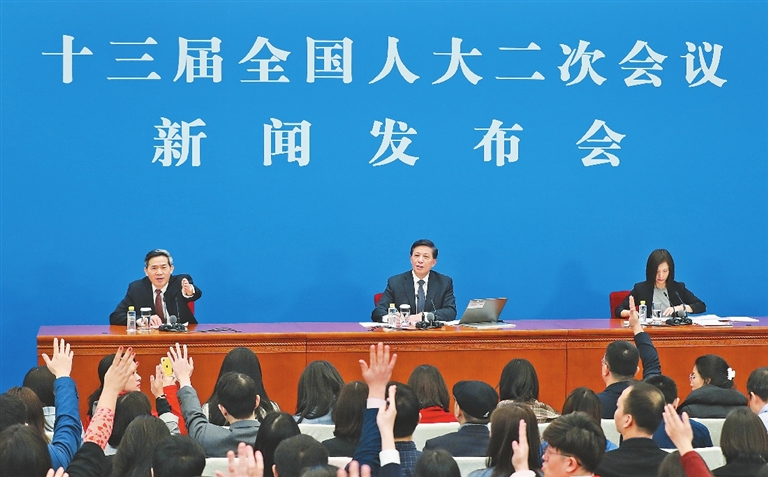
THE adoption of the foreign investment law is an innovation in the legal system on foreign investment and is to replace the existing three laws and serve as the basic law on foreign investment as China continues to open up in the new era, said Zhang Yesui, spokesman for the second session of the 13th National People’s Congress (NPC), at a press conference yesterday. The session will begin today. The draft foreign investment law clearly stipulates that foreign investment in China be subject to pre-established national treatment plus a negative list management system, and the case-by-case approval management mode will be abolished, he said. According to the draft law, industries where foreign investment is prohibited or restricted are specified in the negative list. Industries that are not on the list will be fully open, with domestic and foreign firms enjoying the same treatment. “This is fundamental change in China’s foreign investment management system, and will help create a more open, transparent and predictable environment for investors and provide a stronger legal guarantee on China’s new opening up,” Zhang said. The draft law also has clear positions on the protection of foreign investors’ rights regarding issues such as intellectual property rights protection and technology transfer that are of common concern to foreign investors, according to Zhang. Investments from Hong Kong, Macao and Taiwan regions are distinctive in a way that they are not foreign investment, but are not entirely equivalent to domestic capital, and in practice, they are managed with reference to foreign investments, Zhang said. With the new foreign investment law in place, relevant legal application arrangements will not be changed, and legal systems regarding investment from Hong Kong, Macao and Taiwan will be continuously revised and improved in coherence to the needs of the practice, and will further provide a more open and easy business environment for investors, he said. China-US relations The interests of China and the United States are deeply interwoven and a confrontational China-U.S. relationship does not benefit anyone, he said. China has a clear policy toward its relationship with the U.S., which is based on no-conflict and no-confrontation, mutual respect and win-win cooperation. DPRK-US talks China believes the Hanoi summit between Pyongyang and Washington was constructive and Beijing will continue to play an active role in the Korean Peninsula issue. China hopes Pyongyang and Washington will keep good faith, remain patient and continue their dialogue in the right direction to achieve progress. Defense spending China’s limited defense spending, which is for safeguarding its national sovereignty, security and territorial integrity, poses no threat to any other country. China always sticks to the path of peaceful development and follows policies that are purely defensive in nature. Intelligence law It is neither fair nor ethical for U.S. government officials to play up so-called security risks associated with Chinese companies and link them to China’s National Intelligence Law, Zhang said. This kind of behavior interrupts economic activities with political means, violates World Trade Organization rules and damages fair competition. Belt and Road Initiative China takes debt sustainability in Belt and Road cooperation very seriously, and the country will never impose its will on others, the spokesperson said. The BRI is meant to enhance connectivity, and with that create more opportunities for China and world economic growth, and it complements the existing multilateral cooperation mechanisms. Legislative work Greater focus will be applied in the drafting, revising and deliberating of laws on national security and ecology this year to better prevent and tackle risks and improve environmental protection. The NPC Standing Committee, the country’s top legislative body, “is planning to draft laws on export controls, data security and bio security to strengthen our capacity to defend against and prevent risks,” Zhang said. Personal information The NPC Standing Committee has included personal information in its legislation plan. Departments and authorities are now looking at it and are working on the draft, Zhang revealed. In recent years, with the rapid development of the Internet and information technology, there have been incidents where personal information was improperly collected and abused. AI legislation With artificial intelligence becoming a new front in technological development, the government vows to continuously encourage AI development and application through legislation, accompanied by forward-looking proactive prevention and restraint guidance to ensure safe and controllable application, Zhang said. The legislation for AI is a priority and a debate will be carried out for the sound legal footing for the innovative development of AI. (Xinhua) | 
